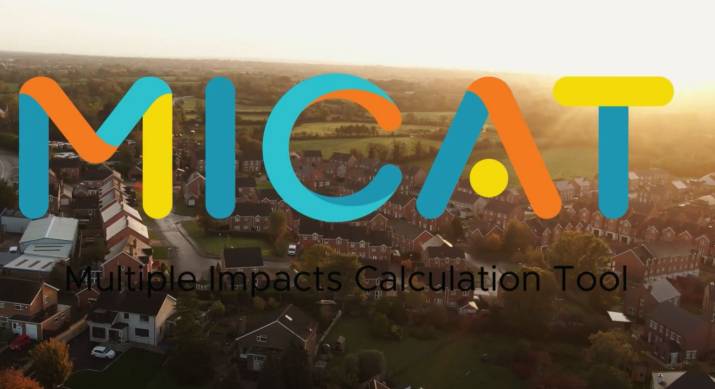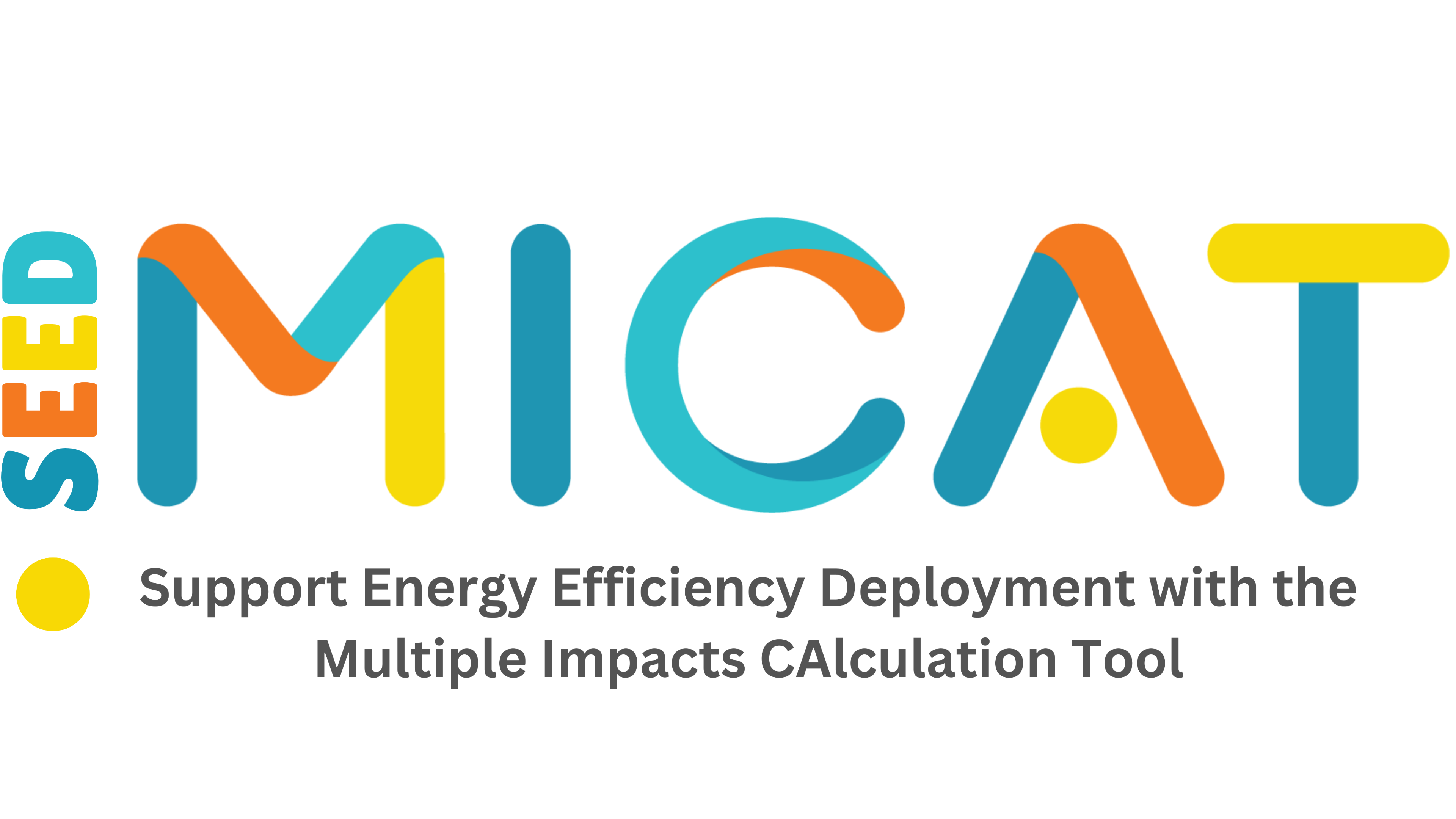What is the MICAT Project?
MICAT – Multiple Impacts Calculation Tool – is a project that aims to develop a comprehensive approach to estimate Multiple Impacts of Energy Efficiency (MI-EE) by co-creating a free, easy-to-use, scientifically sound online tool (MICATool). The MICATool will enable holistic analyses of MI-EE at the European, national and local levels to strengthen the climate strategy of the Energy Union and accelerate an affordable and just sustainable energy transition by addressing the challenges and needs of important target groups: policy makers, practitioners and evaluators.
The MICATool seeks to enable policy-makers and practitioners to conduct simplified analyses for different data and policy scenarios, in order to compare and assess the relevance of the multiple impacts, and strengthen reporting and monitoring at the three governance levels. This can be used to report on target progress at the EU level, for Integrated National Energy and Climate Plans (NECPs) or other reporting requirements at national levels, as well as in local reporting on energy efficiency within Sustainable Energy and Climate Action Plans (SECAPs).

There is still significant potential to improve energy efficiency within all sectors and levels where measures can be applied. In the face of the often cited “energy efficiency gap”, even the profitable potential is not fully exploited. By highlighting the additional value of energy efficiency measures and investments, Multiple Impacts could help close this gap and facilitate better energy-relevant decisions and policy-making.
DURATION OF THE PROJECT

MICAT's final conference
Date
Tue, 24.10.2023, 10:30 Uhr - Wed, 25.10.2023, 18:00 Uhr
RE-energising Europe – Understanding the future of energy demand and its policy implications through new societal trends, behavioural aspects and multiple benefits – Discussions, high-level panels, poster session and field visit organised by 7 EU-funded projects! Taking place in Brussels (Atelier 29) on 24-25 October, the event is bringing together speakers from EU institutions, project representatives and key players of the energy market.
Key topics related to energy in Europe will be tackled including but not limited to:
- community energy,
- energy efficiency,
- multiple benefits,
- women-led initiatives,
- energy behaviour and
- new trends of energy consumption (digitalisation, circular economy and more).
MICAT partnered with newTRENDS and NUDGE projects to highlight multiple benefits, behavioural change, new societal trends and assess future energy demand patterns!
Did you miss the event? You can still watch it here:
HOW DOES IT WORK?
MICAT’s methodological approach builds on existing concepts for quantifying energy efficiency impacts and the role of the Multiple Impacts of EE. Previous research has revealed that a wide range of impacts occur in tandem with an increase in energy efficiency when energy efficiency measures are implemented. They can be categorised into three main categories: social (health benefits or poverty alleviation), environmental (energy savings and reduced GHG emissions) and economic impacts (positive macro-economic impacts on economic growth, employment, innovation and competitiveness). The assessment of Multiple Impacts of EE measures within MICAT will also follow these categories.
The development of the MICATool can only be done properly in cooperation with experts, policy makers, representatives of public administrations and institutions, universities and institutes, businesses and civil society. Involving interested stakeholders in the development activities of MICATool will ensure that the results being created are not only credible, but also relevant, legitimate, and useful for informing further policymaking at all three levels. Moreover, engaging users from the beginning generates trust between stakeholders and with the tool itself, as the MICAT team will be able to tailor the MICATool to the users’ needs while simultaneously providing trainings to exploit the tool to its full potential.
The engagement process will provide feedback to the developing team on all steps of the MICATool within three major moment of exchange:

Step 1: Embedding of the analysis in the energy & climate strategy (scenarios/policies) – November ‘21

Step 2: Analysis of underlying assumptions and methodology of the MICATool – Autumn ‘22

Step 3: Implementation of the MICATool & trainings – Summer ‘23
MICAT Pilot Cities
Click on the images below to learn more about the MICAT pilot cities.
INTERESTED IN LEARNING ABOUT THE MICAT PROJECT AT A GLANCE?
Related Projects
ONGOING PROJECTS

ABOUT THE ODYSSEE-MURE PROJECT
The general objective of the ODYSSEE-MURE project was to provide a comprehensive monitoring of energy consumption and efficiency trends as well as an evaluation of energy efficiency policy measures by sector for EU countries, Norway, Serbia, Switzerland and the United Kingdom. It evaluated and compared energy efficiency progress by sector, and related this progress to the observed trends in energy consumption. In addition, it contributed to the evaluation of national energy efficiency policy measures and analysed their dynamics of implementation. To provide results in an interactive and attractive way to decision makers and actors involved in energy efficiency, the project developed specific data and policy tools.
Duration: 01/10/2022-31/09/2025 | Grant Agreement number: 101075902
ABOUT THE REFEREE PROJECT
The REFEREE project – Real ValuE oF EneRgy EfficiEncyConducting – will analyse and assess the direct and indirect non-energy effects of energy efficiency investments and develop user-friendly tools to support policymakers at the local, regional and national levels. The project will allow households, companies, financing institutions and other stakeholders to assess the multiple effects of their energy efficiency decisions and include the assessment of energy efficiency investments in diverse ecosystems, including low-income regions and socially imbalanced societies.
Duration: 01/10/2020-31/03/2024 | Grant Agreement number: 101000136
ENDED PROJECTS

ABOUT THE EERAdata PROJECT
The EERAdata project – Data-Driven Decision-Support To Increase Energy Efficiency Through Renovation In European Building Stock – aims to develop a decision-support tool to help local administrations in collecting and processing their building data towards assessing the impact of energy efficiency measures and prioritising them in planning, renovating and constructing buildings. The project takes a holistic approach which assesses ecological and socio-economic benefits of energy efficiency measures and targets important players in the local administration and policy space.
Duration: 01/07/2019-28/02/2022 | Grant Agreement number: 847101
ABOUT THE EENVEST PROJECT
To support investor decision-making, the EENVEST project will convert buildings’ energy-efficiency technical requirements into economic indicators for use in assessing financial risks related to deep renovation investment. Through a search and match investment evaluation web-based platform, the finance industry will be able to match energy efficiency investment demand and offer for Italy and Spain’s commercial office buildings. In addition to evaluation methods for linking technical and financial risk, the project will identify, quantify and mitigate technical risks connected with such investments and lower lenders’ credit cost via tailored risk reduction activities.
Duration: 01/07/2020-30/06/2022 | Grant Agreement number: 833112
ABOUT THE M-Benefits PROJECT
The M-Benefits project – Valuing and Communicating Multiple Benefits of Energy-Efficiency Measures – aimed to include the Multiple Benefits (MB) of energy efficiency in investment decisions of companies and thereby substantially increasing the deployment of cost-effective energy saving potentials. It delivered best-practice examples, tools and trainings on the importance of MBs for investment decisions in companies, thereby addressing all relevant decision-makers.
Duration: 01/03/2018-30/06/2021 | Grant Agreement number: 785131

ABOUT THE COMBI PROJECT
The COMBI project – Calculating and Operationalising the Multiple Benefits of Energy Efficiency in Europe - aimed at quantifying the multiple non-energy benefits of energy efficiency in the EU-28 area. It gathered existing approaches and evidence from the EU area and developed modelling approaches for impacts on
- emissions (effects on health, ecosystems, crops)
- resources (biotic/abiotic, metals and non-metals)
- social welfare (disposable income, health)
- macro economy (labour market, public finance, GDP) and
- the energy system (grid, supply-side, energy security).
Duration: 01/03/2015-30/02/2018 | Grant Agreement number: 649724

ABOUT THE DEESME PROJECT
Conducting energy audits and implementing energy management systems can be a source of multiple benefits for companies if they tap into their wide potential: reduced operating costs, increased productivity, improved working environment, and much more. As such, DEESME aims to enable companies, especially small and medium enterprises (SMEs), to engage in the energy transition by taking profit of multiple benefits from energy management and energy audit approaches, as well as provide national authorities with guidelines and recommendations to strengthen their national schemes/policies.
Duration: 01/09/2020-31/08/2023 | Grant Agreement number: 892235

ABOUT THE newTRENDs PROJECT
New societal trends empowered by digitalisation such as shared economy, autonomous driving and low-carbon circular economy could lead to an increase in energy demand if they are not countered by measures with a strong focus on saving energy. The goal of the newTRENDs project is to identify and quantify how new societal trends may affect energy demand. To achieve its goal, it will combine qualitative and quantitative cross-sectoral modelling and explore how energy demand models can be improved to represent new societal trends.
Duration: 01/09/2020-31/08/2023 | Grant Agreement number: 893311

ABOUT THE WHY PROJECT
Energy System Models (ESMs) are tools that help energy experts and policy makers to rationally describe energy systems and systematically evaluate the impacts of long-term energy scenarios. Current ESMs lack accuracy required for proper capture of the use of energy in households. As such, the WHY project is developing a new Causal Model combined with an innovative profiling approach to analyse human decision making in energy consumption and human reactions to energy policy changes. WHY will also create innovative methodologies for short and long term load forecasting.
Duration: 01/09/2020-31/08/2023 | Grant Agreement number: 891943















